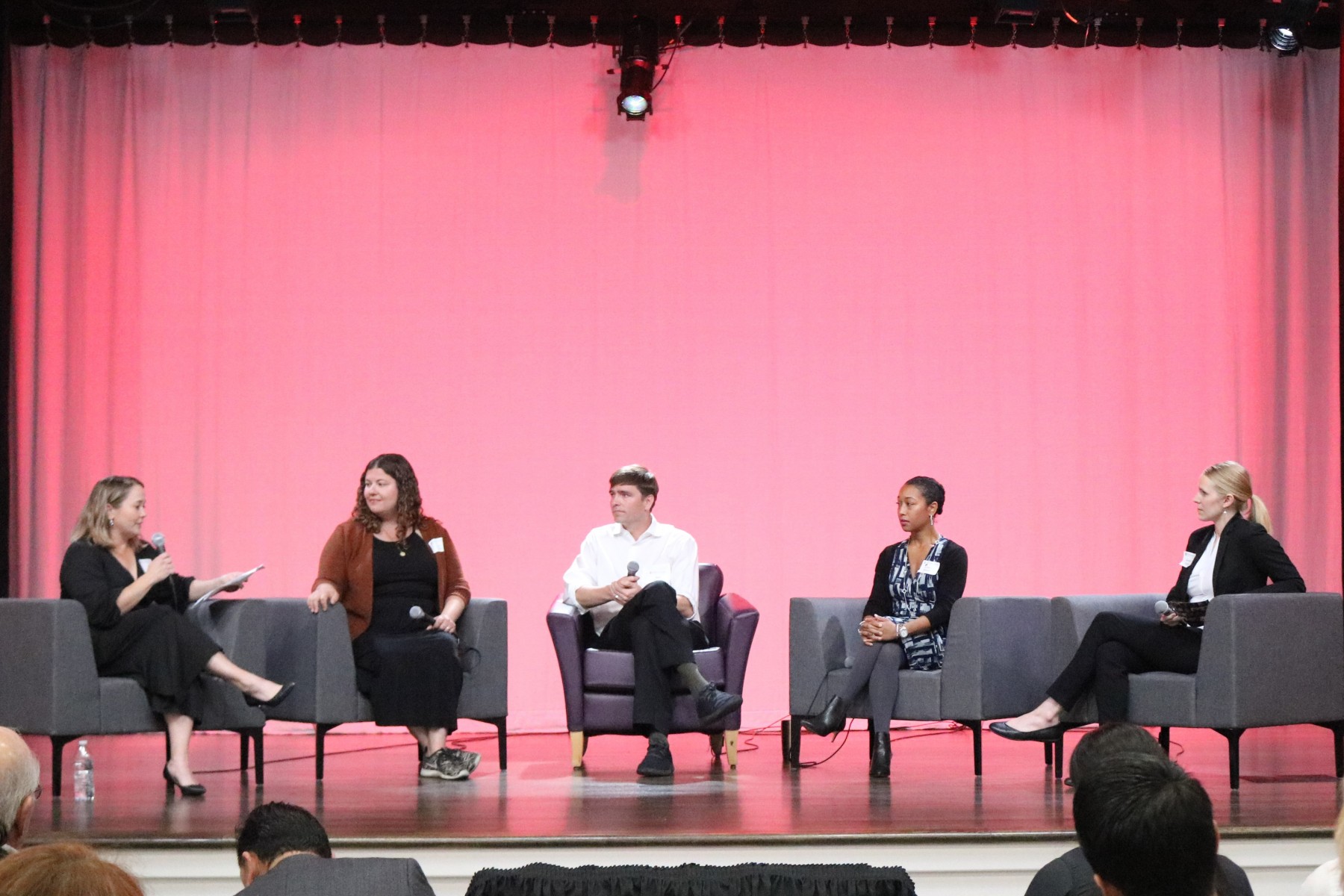An international conversation about the world’s profound food security challenges came to The Ohio State University for North America’s official celebration of World Food Day on Oct. 16.
Ohio State experts joined food and agriculture system leaders from around the nation, including the nonprofit think tank Food Tank and the Food and Agriculture Organization (FAO) of the United Nations, as well as state and local researchers and community organizations, to examine ways to transform agrifood systems to foster inclusive economic growth, address inequalities, increase resilience and achieve sustainable development.
“World Food Day was a time to celebrate, and a time to have uncomfortable conversations that challenge our narratives about the condition of farmers and laborers, food service workers, marketers and eaters, and about the solutions to really complex problems,” said Jill Clark, associate professor in Ohio State’s John Glenn College of Public Affairs and co-founder of the Ohio Food Policy Network, who helped organize the event. “An exciting aspect of challenging narratives is that bridging the space between different ideas can strengthen our democracy at a critical moment when democratic processes are being challenged.”
President Kristina M. Johnson addressed the event in a recorded welcome message.
“Ohio State takes its role in the global movement to end hunger, malnutrition and food insecurity seriously,” Johnson said. “Due to several factors in recent years – most notably the COVID-19 pandemic – the world’s momentum here has gone off track. It’s time to course correct.”
Jocelyn Brown Hall, director of the FAO Liaison Office for North America, explained some of the challenges: Nearly 830 million people around the world are food insecure, meaning they are not getting enough calories and might not survive because of it. Three billion people don’t have access to healthy diets and/or clean water.
“The global agriculture system is a contributor to and casualty of climate change. In the U.S. alone, according to the U.S. EPA, agriculture contributes to about 11% of the greenhouse gases. We have a lot of challenges ahead,” Brown Hall said, adding that national and local governments have a role in finding solutions.
“I think food security and agriculture policy and nutrition security are national security, and therefore part of every government’s responsibility toward its citizenry,” she said.
Discussions at the celebration, hosted by WOSU-NPR, looked at challenges and existing solutions. In addition to addressing international concerns, the event featured panel discussions about food security issues and successful efforts in Ohio.
Jennifer Garner, assistant professor, College of Medicine and John Glenn College of Public Affairs, said that while food security often looks at individuals and households consistently getting sufficient access to food, community food security is a broader vision. It encompasses nutritional adequacy as well as food safety and whether it’s culturally appropriate and maximizes community self-reliance. In her research studying rural Appalachian Ohio during the pandemic, she consistently heard frustration from residents.
“We talk about the Farm Bill and how 75% of it is food assistance programming. What we hear is, yes there is need for those programs, but these communities, our neighbors, don’t want to need these programs,” Garner said, explaining that the residents want to get to a place of communal self-reliance.
Bart Elmore, associate professor of history, is the author of “Seed Money,” a book examining how Monsanto Co., an agrochemical and agricultural biotechnology corporation best known for the Roundup herbicide, came to have outsized influence over our food system. He agreed that meeting a World Food Day theme of “Leave no one behind” requires listening to food system consumers and suppliers. As he traveled the nation to write books, he said, spending time with people and hearing their stories changed him as a person and as a scholar.
“To leave no one behind means having conversations, getting to know your farmers, getting to know the people that produce your food and caring about them and finding ways we can create those connections through the great organizations that are all represented here,” Elmore said.
National speakers at the event included Danielle Nierenberg, president, Food Tank; Dan Glickman, former U.S. Secretary of Agriculture and co-chair of the White House Conference on Hunger, Nutrition and Health task force; and Baldemar Velasquez, president, Farm Labor Organizing Committee, AFL-CIO.
“Whether we are talking about climate, biodiversity, food loss and waste, poverty, education, gender or economic policy,” Nierenberg said, “the food system is really the throughline of all of these issues, and it should be time for those in power to realize it.”
Rattan Lal, Ohio State Distinguished University Professor of Soil Science and 2020 World Food Prize winner, said social-political human dimension issues such as food waste, poverty, civil strife and political instability require attention to meet food and agriculture challenges.
He holds optimism, he said, through proper education about agricultural and natural resources and about respect for the farming profession even as early as the kindergarten level.
“That is where we have to cast the attention of the brightest and the best, right at that age, primary school – to make sure they understand where the food comes from,” he said. “Will it happen? Yes, I’m sure it will.”
The summit was presented in partnership with Food Tank, Ohio State, Ohio Food Policy Network, the FAO and the UN Environment Programme.
 Original source can be found here.
Original source can be found here.
 Alerts Sign-up
Alerts Sign-up